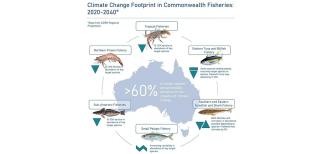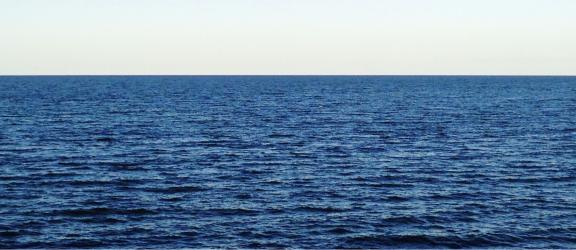Climate change is already impacting Australia’s marine ecosystems and fisheries, and these impacts will increase in coming decades. Understanding what climate change means for fisheries production and management in Australia is crucial for maintaining healthy marine ecosystems and sustainable fisheries into the future.
Climate change and its impact on Australia’s oceans
Climate change is impacting our oceans in complex ways. Australian waters are getting warmer and more acidic, sea-levels are rising, major ocean currents are changing, and extreme weather events are becoming more severe.

Fisheries and climate change
Climate change is affecting Australia’s marine life at all levels, from individual species to entire ecosystems. However not all species are affected in the same way by climate change—the impacts vary by location, habitat, and species.
We have been working with the Commonwealth Scientific and Industrial Research Organisation (CSIRO) and the Fisheries Research and Development Corporation (FRDC) to improve our understanding of climate impacts on Commonwealth fisheries. The ‘Guidance on Adaptation of Commonwealth Fisheries management to climate change’ project rated the sensitivity of over 100 species occurring in Commonwealth fisheries to climate change and modelled the changes likely to occur in these species’ stocks by 2050. The results reveal that:
- all Commonwealth fisheries contain valuable species that are sensitive to climate change
- climate change is likely to influence the abundance of many important species, and
- all fisheries are likely to be more variable into the future.
Southeast Australian waters are a ‘hotspot’ for climate-driven ecosystem changes and a number of species are already being Southern and Eastern Scalefish and Shark Fishery. Modelling predicts that some stocks in this fishery may decline by 20 per cent or more by 2040, due to climate impacts. The sub-Antarctic toothfish stock is also likely to decline, while the Northern Prawn Fishery may experience some decreases and greater variability across most target species. Small pelagic species and squid are not predicted to decrease in the short term, however greater variability can be expected. The infographic below summarises some of the different impacts expected in Commonwealth fisheries by 2040, based on CSIRO’s sensitivity analyses and ecosystem modelling.

The FRDC has region-specific projections of climate impacts on Australian marine ecosystems and the fisheries they support.
AFMA Climate Adaptation Program
We recognise the risks that climate change pose to Australia’s Commonwealth fisheries and we are taking action to ensure our management activities respond to these risks.
Our Climate Adaptation Program aims to ensure information on climate impacts is being incorporated into fisheries management across all AFMA fisheries, and that operational and management adaptation options are being developed and implemented. In 2021, AFMA and the CSIRO teamed up to develop the Adaptation of fisheries management to climate change handbook. This handbook is designed to help fisheries managers and operators identify effective responses to climate change by working through an evidence-based process. We are using this Handbook to develop and implement operational and management adaptation options for our fisheries, in close consultation with the fishing industry and other fishery stakeholders.
AFMA is working closely with world-leading scientists, including the Commonwealth Scientific and Industrial Research Organisation (CSIRO), to understand the sensitivity of fish stocks to climate change and associated impacts on current and future stock status.
Climate and Ecosystem Status Reports include information on the current state (or health) of the environment or ecosystem relative to longer-term trends or target states. They provide a way to integrate a variety of diverse data into a simple overview that can be easily communicated, providing managers and stakeholders with up-to-date trends for a specific region or ecosystem to inform management advice.
AFMA is also developing a Climate Risk Framework to formally integrate climate risk into management decisions for Commonwealth-managed species. The framework is based on a risk assessment approach, similar to that which has been utilised in other fisheries internationally to integrate ecosystem and environmental considerations and uncertainty into existing management frameworks.
Fishery climate and ecosystem status reports
Southern Squid Jig Fishery Climate and Ecosystem Status Reports
- Southern Squid Jig Fishery Climate and Ecosystem Status Report September 2024
- Southern Squid Jig Fishery Climate and Ecosystem Status Report September 2023
Macquarie Island Toothfish Fishery Climate and Ecosystem Status Reports
- Macquarie Island Toothfish Fishery Climate and Ecosystem Status Report August 2024
- Macquarie Island Toothfish Fishery Climate and Ecosystem Status Report August 2023
Heard Island and McDonald Islands Fishery Climate and Ecosystem Status Reports
- Heard Island and McDonald Islands Fishery Climate and Ecosystem Status Report August 2024
- Heard Island and McDonald Islands Fishery Climate and Ecosystem Status Report August 2023
Eastern Tuna Billfish Fishery Climate and Ecosystem Status Reports
- Eastern Tuna Billfish Fishery Climate and Ecosystem Status Report June 2024
- Eastern Tuna Billfish Fishery Climate and Ecosystem Status Report June 2023
Northern Prawn Fishery Climate and Ecosystem Status Report
- Northern Prawn Fishery Climate and Ecosystem Status Report May 2025
- Northern Prawn Fishery Climate and Ecosystem Status Report June 2024
Bass Strait Central Zone Scallop Fishery Climate and Ecosystem Status Reports
- Bass Strait Central Zone Scallop Fishery Climate and Ecosystem Status Report June 2025
- Bass Strait Central Zone Scallop Fishery Climate and Ecosystem Status Report June 2024
- Bass Strait Central Zone Scallop Fishery Climate and Ecosystem Status Report June 2023
Southern and Eastern Scalefish and Shark Fishery Climate and Ecosystem Reports
- Southern and Eastern Scalefish and Shark Fishery Climate and Ecosystem Report November 2024
- Southern and Eastern Scalefish and Shark Fishery Climate and Ecosystem Report November 2023
Torres Strait Tropical Rock Lobster Fishery Climate and Ecosystem Reports
- Torres Strait Kaiar – Tropical Rock Lobster Fishery Climate and Ecosystem Report November 2024
- Torres Strait Kaiar – Tropical Rock Lobster Fishery Climate and Ecosystem Report November 2023
Small Pelagic Fishery Climate and Ecosystem Status Reports
- Small Pelagic Fishery Climate and Ecosystem Status Report November 2024
- Small Pelagic Fishery Climate and Ecosystem Status Report October 2023
Southern Bluefin Tuna Fishery Climate and Ecosystem Status Reports
- Southern Bluefin Tuna Fishery Climate and Ecosystem Status Report September 2024
- Southern Bluefin Tuna Fishery Climate and Ecosystem Status Report August 2023
For other 2023 reports, please contact info@afma.gov.au
Climate adaptation workshop reports
More information
- Adaptation of fisheries management to climate change handbook, CSIRO
- Decadal scale projection of changes in Australian fisheries stocks under climate change, CSIRO Report
- Summary of Commonwealth Fishery Climate Sensitivity, CSIRO Report
- 2021 State of the Environment Report, Marine Chapter
- Building climate considerations into AFMA’s decision making, AFMA
- Managing fisheries in a changing climate, AFMA
- Climate change impacts on fishing and aquaculture, FRDC
- Fisheries in 2050, FRDC
- Climate Change, FRDC
